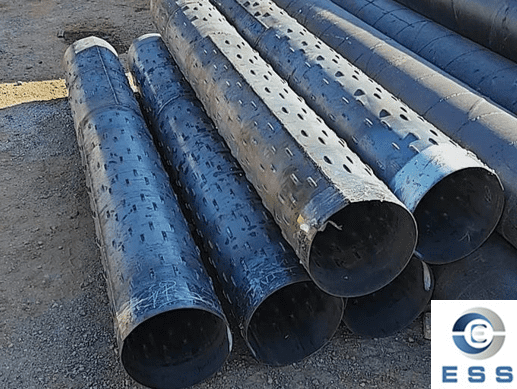
Water Well Casing Pipe Parameters & Size Chart
Water well casing pipe is a crucial
component of water well construction, primarily supporting the well wall,
isolating the aquifer, and preventing collapse and contamination. Its
specifications and dimensions not only affect the well's water yield but also
its structural safety and service life.
Common Water Well Casing Pipe Parameters
1. Model
Water well casing pipe models are typically
named based on their outer diameter and wall thickness.
For example, "DN200×6" indicates a well casing pipe with an outer diameter of 200mm
and a wall thickness of 6mm.
2. Outer Diameter
Water well casing pipe comes in a wide
range of outer diameters, with common sizes including DN100, DN150, DN200,
DN250, and DN300.
The outer diameter should be determined
based on the well's borehole diameter, geological conditions, and required
water volume.
3. Wall Thickness
The wall thickness of water well casing
pipe is also a crucial parameter, directly affecting its pressure-bearing
capacity and service life. Common wall thicknesses include 4mm, 6mm, 8mm, and
10mm.
The choice of wall thickness should be
based on a comprehensive consideration of factors such as geological
conditions, water pressure, and casing pipe material.
Common Water Well Casing Pipe Size Chart
|
Model
|
OD (mm)
|
Wall Thickness (mm)
|
|
DN100×4
|
100
|
4
|
|
DN150×6
|
150
|
6
|
|
DN200×8
|
200
|
8
|
|
DN250×10
|
250
|
10
|
|
DN300×12
|
300
|
12
|
Note: The above chart is for example
purposes only; actual product specifications may vary depending on the
manufacturer and market demand.
How to Choose Water Well Casing Pipe?
When selecting water well casing pipe, in
addition to size, the following factors should also be considered:
1. Geological conditions
Geological conditions vary significantly
between regions, such as rock layers and sandy soil layers.
For gravel or loose soil layers: Choose
thick-walled, high-strength casing pipe to prevent hole collapse.
Rock formations: Casing pipe with
relatively thin walls can be used, but the borehole diameter and well depth
must be considered.
2. Water pressure
Water pressure is also an important factor
to consider when selecting water well casing pipe.
Shallow wells (<100 meters): Pressure is
generally low, so DN100–DN150 with a wall thickness of
4–6mm is often selected.
Deep wells (>200 meters) or confined
water formations: Pressure is higher, so DN200 or above with a wall thickness
of ≥8mm is recommended.
3. Material selection and service life
The service life of water well casing pipe
is closely related to its material and operating environment.
Carbon steel casing pipe: With a service
life of approximately 20–30 years, it is cost-effective
and has high pressure-bearing capacity. It is commonly used in engineering and
industrial wells.
Stainless steel casing pipe: With a service
life of approximately 30–50 years, it offers excellent
corrosion resistance and is suitable for wells with high salinity or where a
long service life is required.
PVC/UPVC casing pipe: With a service life
of approximately 15–25 years, it's lightweight and
corrosion-resistant, making it suitable for shallow wells or rural private
wells, but its strength is lower.
FAQ
Q1: What are the common standards for
water well casing pipe?
A1: Common standards include API 5CT (casing pipe standard for the oil and gas industry), GB/T 14976 (stainless
steel pipe standard), and ISO standards.
Q2: What are the differences between
deep and shallow well casing pipe?
A2: Deep wells must withstand higher water
pressure and formation stress, so thick-walled steel
casing pipe is generally used. Shallow wells can use lightweight PVC or
thin-walled steel pipe.
Q3: What is the price of water well casing
pipe?
A4: The price of water well casing pipe is
significantly affected by the material, specifications, wall thickness, and
market conditions. For example, carbon steel water well casing pipe costs
approximately US$700–1,200 per ton.
Summary
The selection and installation of water
well casing pipe are key aspects of water well construction, with outer
diameter, wall thickness, and material being the three key parameters. The
right choice can not only increase the water output of the well, but also
significantly extend its service life and reduce maintenance costs.
Read more: Which Material Is the Best for Well Casing Pipes?













 Eastern Steel Manufacturing Co.,Ltd not only improve product production and sales services, but also provide additional value-added services. As long as you need, we can complete your specific needs together.
Eastern Steel Manufacturing Co.,Ltd not only improve product production and sales services, but also provide additional value-added services. As long as you need, we can complete your specific needs together.










